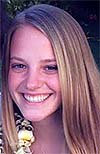Portfolios help students see all they've learned

Learning does not end in the classroom. Students also absorb skills and knowledge — even if they don't realize it at the time — through a variety of activities, memberships and living-arrangement responsibilities.
How to measure, assess and demonstrate the educational value of the whole college package? At Augustana, there's a portfolio for that.
In a pilot project this past year, 20 students completed Comprehensive Learning Portfolios, in which they assessed and then made a case on how well they've done toward achieving each of Augustana College's nine Student Learning Outcomes. Those outcomes were adopted in 2012, and are meant to encompass the whole package of what a strong college education should be.
Then came the realization that there should be a way of assessing how well those nine learning outcomes are being absorbed, said Dr. Mike Egan, associate professor of education, who oversaw the pilot Comprehensive Learning Portfolios project.
The portfolios, he said, basically asked the participating students to "tell us how you have learned or grown relative to these nine things. So they basically made a case."
Three students whose web-based portfolios demonstrate the potential of the project as it expands are Somer Druszkowski, David Voland and Jessica Launius.

"All it took was one education class for me to know in my heart that I wanted to become a teacher, but it was still difficult for me to explain why to my family and friends. Analyzing my college experience thus far, based on the nine learning outcomes, has helped me to articulate and defend my future vocation as being perfect for me." — Somer Druszkowski |
How it fits together
The participants say the experience of documenting and making a case for what they've learned both inside and outside the classroom was a valuable reflective experience, and one that will help in job interviews.
"This project was definitely a valuable experience for me," Voland said. "Being able to reflect on my learning experiences inside and outside of the classroom has been very useful and rewarding. Not only do I have something to show employers about what I've learned, but I also have a deeper understanding of how everything I've learned fits together."
As an example of an experience outside of class, Launius said she was co-director of Camp Kesem, a summer camp organized by an Augustana student group for children affected by a parent's cancer, in 2014-15.
"That role really impacted my definition of leadership," she said. "However, I don't think I would have realized how deeply this impacted me had I not done the learning portfolio. Often times, it's difficult to reflect on something when you're in the thick of it, but also reflection isn't something I naturally do, so this granted me the opportunity to take a step back from what I've been doing and really look at how that's affected me as a person."
Druszkowski demonstrated her growth in the learning outcome of Intercultural Competency by describing volunteer tutoring of local refugee and immigrant children that was part of a class called Urban School Legends. The volunteering was through the Spring Forward Learning Center, and she liked it so much she also volunteered for Opportunity Kicks Tutoring, an Augustana partner that also has a soccer team for local children from overseas. As a member of the Augustana women's soccer team, she was able to plan a game with college players.
"As a prospective teacher I obviously enjoy the tutoring component; however, the time spent during the fun activity is what drew me into the program the most because I love talking to the kids and learning about their lives," she wrote in her portfolio.
